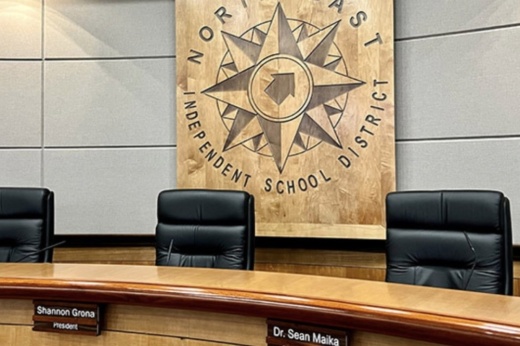The background
The Texas Legislature in 2023 passed Senate Bill 763, which allows public school trustees to decide whether their district can have chaplains offer support to students on campuses.
Since SB 763 went into effect Sept. 1, public school district boards statewide have been required to vote on adopting a policy on chaplains.
Chaplains are religious representatives who serve in nonreligious environments, such as military units, hospitals, prisons and schools.
According to the legislation, chaplains may provide mental or behavioral health support, or suicide prevention or postvention services.
Unlike traditional school counselors, chaplains would not be subject to State Board for Educator certification. Chaplains registered as sex offenders would be prohibited from working within school systems.
Dig deeper
Several visitors at the Feb. 12 NEISD board meeting asked board members not to tweak policies to permit campus chaplains.
Paul Ziese, senior pastor at MacArthur Park Lutheran Church, voiced worry that changing policies in NEISD could open the door to nonscreened individuals who may lack the proper training to provide social, emotional and social guidance to students.
“We should make sure we do not have unvetted people in our public schools,” Ziese said.
Mara Nathan, senior rabbi at Temple Beth-El, said she agreed with Ziese’s comments, adding the role of a school counselor is reserved for individuals who have been specifically schooled and trained for it.
Nathan also said she is troubled by the idea of chaplains affiliated with a specific organized religion might be perceived as proselytizing.
“By having religious chaplains in schools, this creates an environment that takes away religious neutrality in a space that should remain secular,” Nathan said.
Churchill High School student Emeriek Moreno said NEISD’s student population is culturally and religiously diverse, and that having chaplains in public schools goes against the concept of separation of church and state.
“We need quality high school counselors who know the coping mechanisms needed, and steps and actions to take when a student reaches out for help,” Moreno said.
Resident Tim Taylor asked the NEISD board to change policies to permit chaplains. He said being a former chaplain in the Texas Department of Criminal Justice system, he can see the benefits of having chaplains in prisons and in other organizations—from business to sports—to provide guidance to individuals who want it.
“Chaplains in schools can make a difference in the lives of students and staff,” Taylor said.
What they're saying
Trustee David Beyer said NEISD employs wholly qualified counselors who are capable of extending guidance to students who seek it out.
“I think we have a standard that we want to uphold and don’t want to deviate from that,” Beyer said.
Trustee Diana Sciba Villarreal said many of her constituents in Single-Member District 3 do not support having chaplains in schools even though she may feel a policy change could benefit the school district.
“If our communities are overwhelmingly saying, ‘We don’t want this,’ I feel it’s my responsibility, as [constituents’] voice, to not override that,” Villarreal said.
Villarreal asked whether the district would be held liable if a tragedy, such as a student suicide, were to occur at NEISD and if the district did not change policies to permit school chaplains.
NEISD attorney Ricardo Lopez said the district could not be held legally responsibly in such a scenario.
Trustee Marsha Landry urged the board to at least revise policies to permit volunteer chaplains, but Beyer said it would be difficult for NEISD officials to find the legal means to make that happen in a way that does not open the district to legal challenges down the road.
“I think it’s a slippery slope to try and say chaplains can volunteer as a chaplain, but I think there’s room there where a chaplain talks with a child, the child goes home, and mama’s not happy,” board President Shannon Grona said.
The board voted 5-1 against changing the policy with Landry casting the lone dissenting vote.





